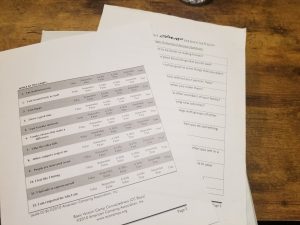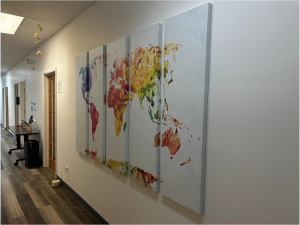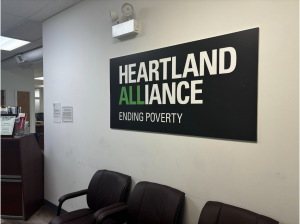 As I sit down to write this blog post, one realization crosses my mind. It is the realization that time keeps marching forward, and that is especially true when it comes to summer and my placement. As of the first week of July, I have officially hit the halfway mark of my duties serving Opportunity Enterprises and Camp Lakeside. The phrases “Time flies when you’re having fun” and “You never truly appreciate what you have until it’s gone” perfectly define and encompass what this experience has been. As I look back at what I have accomplished, a lot of it hasn’t felt as actual work. This is not only true for myself, but also for the campers and staff that I interact with on a daily basis. While much of my job is done behind the scenes, I also have many opportunities throughout the week to interact with campers in a way that I still fulfill my duties as a researcher for the camp and OE as a whole.
As I sit down to write this blog post, one realization crosses my mind. It is the realization that time keeps marching forward, and that is especially true when it comes to summer and my placement. As of the first week of July, I have officially hit the halfway mark of my duties serving Opportunity Enterprises and Camp Lakeside. The phrases “Time flies when you’re having fun” and “You never truly appreciate what you have until it’s gone” perfectly define and encompass what this experience has been. As I look back at what I have accomplished, a lot of it hasn’t felt as actual work. This is not only true for myself, but also for the campers and staff that I interact with on a daily basis. While much of my job is done behind the scenes, I also have many opportunities throughout the week to interact with campers in a way that I still fulfill my duties as a researcher for the camp and OE as a whole.
While my main focus is of course gathering the necessary data through my observations, this can be done in a variety of ways. As the weeks of camp have passed I have learned that, for much of what I do, I don’t always have to be a separate entity. As I collect data, I have many ways that I am able to collect, which can vary day to day. I have found that what makes my job the easiest is putting my plain, frankly boring, white binder full of assessments, and enjoying the freedoms of childhood with the campers. Most days, there are set activities that each group of campers have the opportunity to participate in (such as archery, water play, art, music, etc.). These activities, as well as a few others, allow me to interact with campers in ways where I am able to observe and collect the necessary data, while also getting the chance to have a sort of “neutral ground”. Because of the position that I am in, as a sort of 3rd party, as compared to other staff such as counselors, I am able to participate in the various games and activities as someone who isn’t directly linked to the campers or the group. This might mean going on a nature walk around the edges of the lake where the lily pads grow, or playing a game of kickball. Much, if not all, of what I am observing in the clients/campers is the potential growth in various skills that are important in social wellbeing, independence, and friendship building. And as my supervisor has said from the beginning of us working together, “One of the greatest tools for learning is play”.

As I look back and reflect on this journey so far, there have been many things to appreciate. One of the most impactful to me is having the opportunity to interact (in so many different ways) and talk with the campers and OE clients on a regular basis. My job is to learn about these individuals and assess how they are improving or changing based on certain criteria and assessments, but I have found that I have learned almost as much about myself as I have about them. Working in this type of environment has a way of shining a light on who we are as a society, and who we are as individuals, and I am truly grateful for all that has come my way up until this point.
Your fellow at Opportunity Enterprises and Camp Lakeside,
Rasheed Jibriel
 We often hear the phrase “don’t make excuses, make improvements”. For many, this may be a difficult thing to be told – this kind of statement misses and overlooks the individual nuances and circumstances of the situation we find ourselves in. But despite these challenges, we now find ourselves forced to continue on with no acknowledgement of them.
We often hear the phrase “don’t make excuses, make improvements”. For many, this may be a difficult thing to be told – this kind of statement misses and overlooks the individual nuances and circumstances of the situation we find ourselves in. But despite these challenges, we now find ourselves forced to continue on with no acknowledgement of them. When I take a step back now and consider Heartland’s broader role in its community, it falls in some sense along the lines of this exact idea, providing solutions in all kinds of forms in housing, employment assistance, vocational English language training and even trauma assistance. The team here can only think in these terms (solutions, that is); when people’s livelihoods depend on you, you have no choice.
When I take a step back now and consider Heartland’s broader role in its community, it falls in some sense along the lines of this exact idea, providing solutions in all kinds of forms in housing, employment assistance, vocational English language training and even trauma assistance. The team here can only think in these terms (solutions, that is); when people’s livelihoods depend on you, you have no choice.